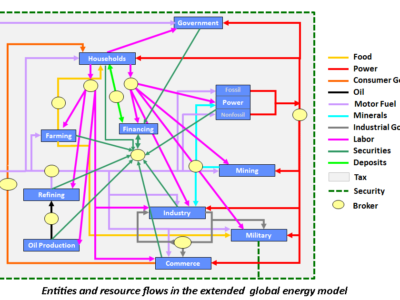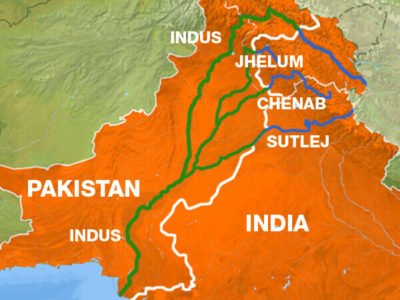The GOP’s Climate Views Are Thawing
Significant parts of the GOP seem to be leaving Trump behind on the climate issue.
There were three interesting stories about climate politics in the papers today: one about Trump, one about other Republicans, and one about both. What these stories tell us is that part of the GOP is coming to terms with reality; Trump not surprisingly is not. First, as to Trump. As you may have noticed, Trump is not a member of what a Bush advisor once dismissively called the "reality-based community." Instead, to quote one of his own advisors, he's more attuned to ...
CONTINUE READINGSingle-Use Plastics Need Comprehensive Federal Legislation
Despite state and local action, more effective reduction of single-use plastics must come from Congress.
Editor's note: this article was originally published in The Regulatory Review on February 13, 2019. Plastic pollution appears to be arising ever more frequently in the news. Companies like Starbucks have announced voluntary steps to rid their stores of plastic straws. China is wielding its “National Sword” policy, which places restrictions on the amount and type of plastic waste it will accept from abroad, which has prompted cries for improvements to recycl...
CONTINUE READINGScoping Out the Green New Deal
How would we go about decarbonizing the most needy U.S. states?
Progressives are calling for a Green New Deal. The details are still very fuzzy, despite the House resolution introduced by Markey and Ocasio-Cortez. That proposal as a ten-year timetable to eliminate carbon, which is highly unrealistic. Nevertheless, it's worth thinking about what an all-out effort to decarbonizing the economy would look like. The Green New Deal is also about creating good jobs across the economy, and we should take the factor into account as well. ...
CONTINUE READINGNot Quite The Analogy We Wanted
Kurt Vonnegut and Seeming Futility
My rapidly accelerating senility means that I have to catch up on reading I should have done when I was younger. So I just started Kurt Vonnegut's classic Slaughterhouse Five. And right at the beginning, this exchange jumped out at me. The protagonist tells a big Hollywood producer that he is thinking about writing a book about the infamous Dresden firebombing in 1945: "Will it be an anti-war book?," he asked. "I guess," I said. "Why don't you write an anti-glacie...
CONTINUE READINGMore on saving the monarch butterfly
Both federal and state action are needed, and it will take more than milkweed planting
Eric posted an excellent analysis last month of the desirability of protecting the monarch butterfly under California's Endangered Species Act (CESA). I wanted to add a brief coda (as well as a couple of pictures) to his post, to emphasize the need for federal as well as state action, and to expand on the steps that might be needed to bring these beautiful butterflies back. As Eric points out, the monarch has experienced a precipitous recent decline in California....
CONTINUE READINGFunny, It Doesn’t Look Bluish
Strong Push for Renewables in the Land of Enchantment - But Is It a Bailout?
Although it reliably votes for Democratic Presidential candidates, has two Democratic United States Senators, and a trifecta of Democratic control in the state house, blue-state New Mexico is not usually thought of as a progressive environmental leader. The State Public Regulation Commission -- one of only 13 directly elected by voters -- has been plagued with scandals. And even now, advocates have complained about the Commission's tendency to favor utilities over consum...
CONTINUE READINGBottoms-Up! An Emerging New Governance System (4)
We can think of the energy system as a kind of ecosystem, and renewables as an invasive species.
As I’ve discussed the earlier three posts in this series, it is possible to imagine a cycle of positive feedback, in which the history of past climate efforts increases the likelihood of future ones and even draws more jurisdictions into the effort. But it is also possible to imagine that bottom-up efforts might not catch hold, fading away over time. In that scenario, the initial sparks might simply die out rather than taking fire. Under what circumstances might we exp...
CONTINUE READINGThe 2019 Oscars Has a Climate Change Contender
Paul Schrader’s First Reformed nominated for best original screenplay
Clear your calendar and prepare your popcorn – the 2019 Oscars will be awarded on Sunday night. This year climate change has a contender, and no, it’s not An Inconvenient Sequel. In the category of original screenplay, Paul Schrader has been nominated for First Reformed, a contemporary tale about the struggles of a priest in upstate New York grappling with the death of his son, a parishioner’s anguish over environmental destruction, and the corruption of hi...
CONTINUE READINGA Time For Privacy: California Legislature Moves to Protect Academic Research
In an era defined in Washington by lies and the suppression of scientific research, California is positioning itself as a defender of facts and free inquiry. Assemblymember Laura Friedman (D, Los Angeles) this week introduced Assembly Bill 700, a bill sponsored by the Union of Concerned Scientists (UCS) to address the harm inflicted on public university scholars by harassing requests under the California Public Records Act. Records requests are made to harass rather ...
CONTINUE READING…For Fighting Over
Nuclear-Armed India Announces Water Cut-Off To Nuclear-Armed Pakistan
Uh-Oh: Union minister Nitin Gadkari in a tweet has confirmed that India would 'choke' the water supply to Pakistan in light of the Pulwama attack. The move comes in the backdrop of the February 14 attack on CRPF convoy in Pulwama in Jammu and Kashmir, which resulted in the death of 40 CRPF personnel. India will divert water from eastern rivers and supply it to the people of Jammu & Kashmir and Punjab, read Gadkari's tweet. Under the Indus Waters Treaty, India sha...
CONTINUE READING













